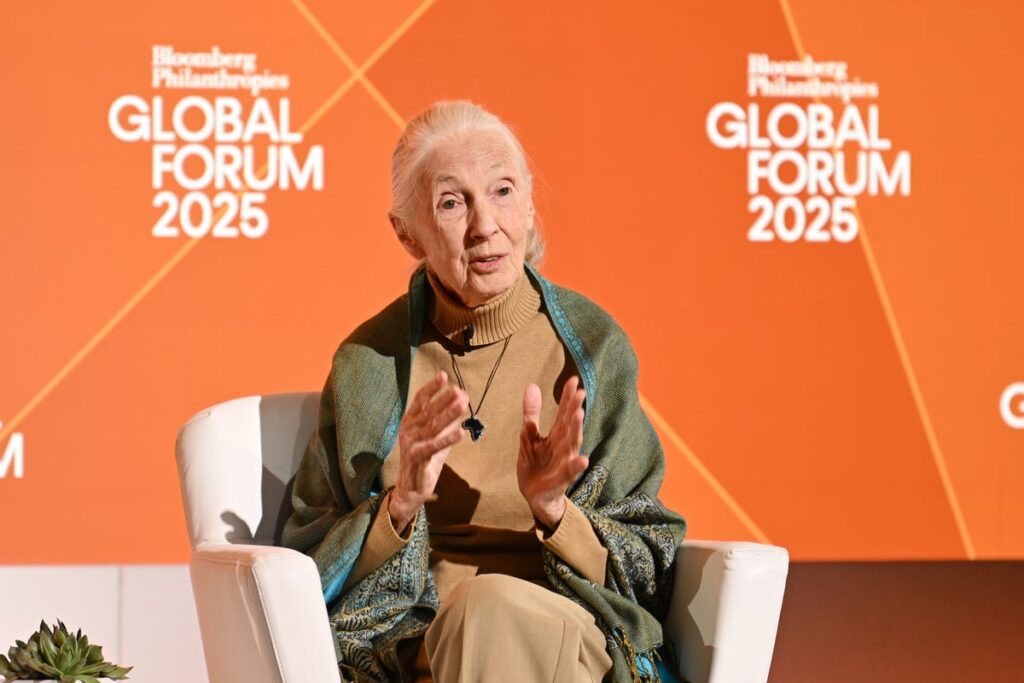October 1, 2025
2 min read
Jane Goodall, Trailblazing Primatologist and Chimpanzee Conservationist, Has Died
The anthropologist was famous for her pioneering research with chimpanzees and her influence on conservation
Jane Goodall speaks onstage at the Bloomberg Philanthropies Global Forum 2025 at The Plaza Hotel on September 24, 2025 in New York City.
Bryan Bedder/Bloomberg Philanthropies/Getty Images
Iconic primatologist and conservation scientist Jane Goodall has died at the age of 91 from natural causes, according to a statement from the Jane Goodall Institute, which she founded in 1977.
Goodall was best known for her pioneering studies of chimpanzees in the wild. She visited Tanzania for the first time in 1960, when she was 26, and began observing chimpanzees at what was then called Gombe Stream Game Reserve. Unlike more traditional scientific observations, Goodall named the chimpanzees she watched, rather than referring to them by numbers, and she brought a keen eye and emotional connection to her view of their behaviors. (She also regularly went barefoot, according to the institute she founded.)
READ MORE: Jane Goodall on Traveling the World and Speaking Up for Animals
On supporting science journalism
If you’re enjoying this article, consider supporting our award-winning journalism by subscribing. By purchasing a subscription you are helping to ensure the future of impactful stories about the discoveries and ideas shaping our world today.
Early in her work in Gombe, Goodall observed a chimpanzee she called David Greybeard at work foraging for termites using bits of plant matter. She documented tool use among chimps in an era when scientists believed that only humans had such capacity. Although Goodall said she had expected the chimpanzees she studied to be highly intelligent, the animals were scientific mysteries at the time.
As her research became more prominent, she became an iconic scientist—and an inspiration for women in science—and then an outspoken advocate of conservation.
Scientific American spoke with Goodall in 2010 to mark her 50th anniversary with chimpanzees and asked her what she considered her most significant contributions.
“Breaking down this perceived sharp line between us and other creatures,” Goodall said. “I think chimpanzees have helped people understand that we are part of and not separated from the animal kingdom, and that has opened the way to having respect for the other amazing beings with whom we share the planet.”
It’s Time to Stand Up for Science
If you enjoyed this article, I’d like to ask for your support. Scientific American has served as an advocate for science and industry for 180 years, and right now may be the most critical moment in that two-century history.
I’ve been a Scientific American subscriber since I was 12 years old, and it helped shape the way I look at the world. SciAm always educates and delights me, and inspires a sense of awe for our vast, beautiful universe. I hope it does that for you, too.
If you subscribe to Scientific American, you help ensure that our coverage is centered on meaningful research and discovery; that we have the resources to report on the decisions that threaten labs across the U.S.; and that we support both budding and working scientists at a time when the value of science itself too often goes unrecognized.
In return, you get essential news, captivating podcasts, brilliant infographics, can’t-miss newsletters, must-watch videos, challenging games, and the science world’s best writing and reporting. You can even gift someone a subscription.
There has never been a more important time for us to stand up and show why science matters. I hope you’ll support us in that mission.

